Related Research Articles

Rhineland-Palatinate is a western state of Germany. It covers 19,846 km2 (7,663 sq mi) and has about 4.05 million residents. It is the ninth largest and sixth most populous of the sixteen states. Mainz is the capital and largest city. Other cities are Ludwigshafen am Rhein, Koblenz, Trier, Kaiserslautern, Worms, and Neuwied. It is bordered by North Rhine-Westphalia, Saarland, Baden-Württemberg and Hesse and by France, Luxembourg and Belgium.

The Palatinate, or the Rhenish Palatinate (Rheinpfalz), is a historical region of Germany. The Palatinate occupies most of the southern quarter of the German federal state of Rhineland-Palatinate (Rheinland-Pfalz), covering an area of 2,105 square miles (5,450 km2) with about 1.4 million inhabitants. Its residents are known as Palatines (Pfälzer).
Elfriede "Friedel" Grützmacher is a German politician.
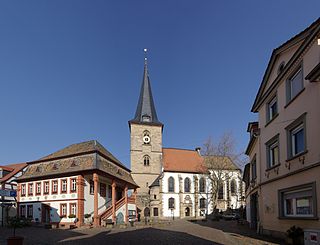
Freinsheim is a town in the Bad Dürkheim district in Rhineland-Palatinate, Germany. With about 5,000 inhabitants, it is among the state's smaller towns. It is also the seat of the like-named Verbandsgemeinde, a kind of collective municipality.
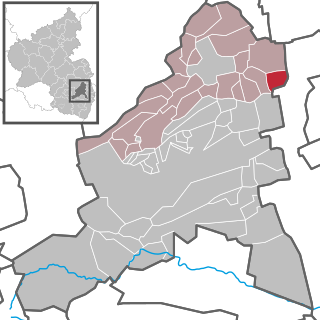
Gerolsheim is an Ortsgemeinde – a municipality belonging to a Verbandsgemeinde, a kind of collective municipality – in the Bad Dürkheim district in Rhineland-Palatinate, Germany.
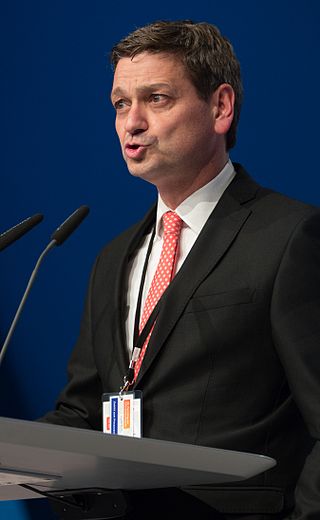
Christian Baldauf is a German lawyer and politician of the Christian Democratic Union who has been serving as a member of the Landtag of Rhineland-Palatinate since 2001, where he is the leader of the CDU parliamentary group and thus the leader of the opposition.

The Deutsche Staatsphilharmonie Rheinland-Pfalz is a German orchestra based in the German state of Rhineland-Palatinate, in Ludwigshafen am Rhein.
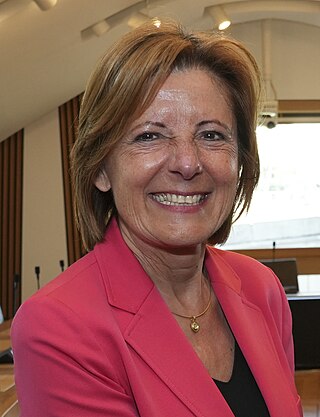
Marie-Luise "Malu" Dreyer is a German politician of the Social Democratic Party (SPD) who has served as the 8th minister-president of Rhineland-Palatinate from 2013 to 2024. She is the first woman to hold this office. She served a one-year-term as president of the Federal Council from 1 November 2016 – 31 October 2017, which made her deputy to the president of Germany while in office. She was the second female president of the Federal Council and the sixth woman holding one of the five highest federal offices in Germany. On 19 June 2024 she announced her resignation from the office of minister-president with effect from 10 July.

Julia Klöckner is a German politician of the Christian Democratic Union (CDU) who served as Federal Minister of Food, Agriculture and Consumer Protection in the government of Chancellor Angela Merkel from 2018 to 2021. Since 2012, she has also been part of the CDU leadership.

The Rehberg is a prominent hill, 576.8 m above sea level (NHN), in the German state of Rhineland-Palatinate. After the Grand Wintersberg (ca. 581 m) in French North Alsace, the Rehberg is the second highest hill in the Wasgau, the Franco-German region that forms the southern part of the Palatine Forest and runs from the valley of the River Queich to the Col de Saverne. The Rehberg is also the highest hill on German soil in the Wasgau. As part of the Palatine Forest-North Vosges Biosphere Reserve it has been placed under special protection measures.

Guttenberg Castle is a ruined rock castle near the French border in the German part of the Wasgau, which in turn is part of the Palatine Forest in the state of Rhineland-Palatinate.

The Palatine Higher Regional Court in Zweibrücken is one of two Higher Regional Courts in the German state of Rhineland-Palatinate, along with the Higher Regional Court in Koblenz.
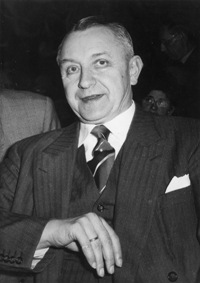
Wilhelm Boden was a German lawyer, civil servant and politician. From 1946 to 1947 he was the first Minister President of Rhineland-Palatinate.

The 2016 Rhineland-Palatinate state election was held on 13 March 2016 to elect the members of the Landtag of Rhineland-Palatinate. It was held on the same day as the Baden-Württemberg state election and Saxony-Anhalt state election. The incumbent coalition government of the Social Democratic Party (SPD) and The Greens led by Minister-President Malu Dreyer was defeated. The SPD remained the largest party, and formed a "traffic light coalition" with the Free Democratic Party (FDP) and The Greens. Dreyer was subsequently re-elected as Minister-President.

Eveline Lemke is former German politician and member of the Alliance 90/The Greens. From 18 May 2011 until 18 May 2016, she was vice minister president of Rhineland-Palatinate and Minister for Economics, Climate Protection, Energy and Regional Planning. On 27 March 2011, she was elected into the Landtag of Rhineland-Palatinate. She was the leading candidate for her party in the 2016 Rhineland-Palatinate state elections along with The Greens faction leader in the Landtag, Daniel Köbler, after having been leader of the party since 2006. As vice minister Lemke represented the state of Rhineland-Palatinate in the German Bundesrat. As author and speaker in green technological issues and Circular Economy, she founded Thinking Circular in 2017. This thinktank is listed in the Sustainable Development Goals Help Desk, a platform by the United Nations since July 2018. She is also working as consultant together with Prof. Michael Braungart, chemist and inventor of the design philosophy Cradle-to-Cradle, Martin Lees and David Wortmann (DWR-Eco-Innovation-Alliance).

Ursula Männle is a German Social sciences academic and politician (CSU). She served between 1983 and 1994 as a member of the Bundestag. More recently, between 2000 and 2013, she was a member of the Bavarian Landtag, chairing an important parliamentary committee and, till 2009, chairing the women's working group in the Landtag.
Helene Rothländer was a German teacher and politician. Directly before the cancellation of German democracy she served briefly as a member of the Prussian parliament.

The 2021 Rhineland-Palatinate state election was held on 14 March 2021 to elect the 18th Landtag of Rhineland-Palatinate. The outgoing government was a "traffic light coalition" of the Social Democratic Party (SPD), Free Democratic Party (FDP), and The Greens led by Minister-President Malu Dreyer.
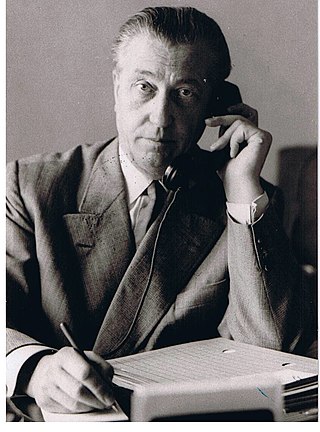
Wilhelm Nowack was a German economist who became a journalist and, more briefly, a radio producer. He was also politically engaged. A committed believer in democracy and supporter of the German republic, in 1924 he was a co-founder of the Reichsbanner Schwarz-Rot-Gold movement. Much later, between 1949 and 1952, he served as a member of the ”Bundestag”, based at that time in Bonn. In 1951 he accepted an appointment as State Minister for Finance and Reconstruction for Rhineland-Palatinate, and just over a year later he resigned his seat in the Bundestag.
The Constitution of Rhineland-Palatinate is the constitution for the state of Rhineland-Palatinate adopted by referendum on 18 May 1947.
References
- 1 2 3 4 Entry for Ulla Bergheimer in the Rheinland-Pfälzische Personendatenbank
- ↑ Hedwig Brüchert (compier-producer): Rheinland-Pfälzerinnen. Frauen in Politik, Gesellschaft, Wirtschaft und Kultur in den Anfangsjahren des Landes Rheinland-Pfalz. 2001, ISBN 3-7758-1394-2, p.37
- ↑ Monika Storm (2007). "Die Mütter der Verfassung" (PDF). Frauen der ersten Stunde Rheinland-pfälzische Landtagspolitikerinnen 1946-1955. Landeszentrale Politische Bildung, Rheinland-Pfalz, Mainz. pp. 1–7.